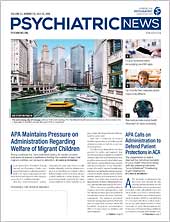“When I use a word,” Humpty Dumpty said, “it means just what I choose it to mean—neither more nor less.” —Lewis Carroll (Through the Looking Glass)
Suicide has dominated the news recently, fueled by celebrity suicides; rising rates of adolescent suicide; and the report by the AMA’s Council on Ethical and Judicial Affairs (CEJA). The report recommended that (1) the AMA retain its 1994 Code of Medical Ethics Opinion 5.7, stating that physician-assisted suicide is “fundamentally incompatible with the physician’s role as healer”; and (2) the AMA retain the term “physician-assisted suicide” rather than “medical aid in dying.” Nevertheless, on June 11, the AMA’s House of Delegates voted 56-44 to send the CEJA report back to the council for further work.
Intense controversy surrounding the term “suicide” may have swayed some delegates. Ordinary language and common law hold that when a mentally competent person deliberately takes his or her own life, this is suicide—regardless of the “context” of the act. On this view, “medical aid in dying” is a misleading euphemism, and physicians who help their terminally ill patients kill themselves are carrying out “physician-assisted suicide” (PAS). So say the AMA, the American College of Physicians, the World Medical Association, and the American Nurses Association—all of which oppose PAS. In contrast, the American College of Legal Medicine rejects the term “suicide” with regard to acts permitted by “aid-in-dying” legislation, preferring the phrase “process intended to hasten the end of life.” Similarly, the American Association of Suicidology (AAS) argues that “the practice of physician aid in dying (PAD) is distinct from the behavior that has been traditionally and ordinarily described as ‘suicide’ ” although “there may be overlap between the two categories. …”
Space constraints limit rebuttal of the entire AAS position. Suffice it to say that it fallaciously conflates the meaning of “suicide” with the clinical context in which suicide typically occurs. One claim merits particular skepticism. The AAS rightly notes that “suicide in the ordinary, traditional sense is much more common among those with mental illness,” which may markedly impair judgment. In contrast, the AAS argues that under current PAD statutes “…mental illness that would affect the rationality of decision making is screened out.” Yet most statutes modeled on the Oregon Death With Dignity statute do not require evaluation by a mental health professional, unless physicians “determine that the patient’s judgment is impaired.” In a study published in BMJ, Ganzini and colleagues found that the Oregon statute “may fail to protect some patients whose choices are influenced by depression” from receiving a lethal drug.
Furthermore, under current interpretation of the Oregon statute, a patient with a chronic illness who refuses life-saving treatment—and will likely die within six months without it—can be declared terminally ill. Thus, a patient with severe anorexia nervosa who refuses treatment could be considered “terminal” and be prescribed a lethal drug. Psychiatrists should find this very disturbing.
It’s easy to get caught up in “terminology wars” and ignore the underlying ethical question: is prescribing a lethal drug to terminally ill patients “fundamentally incompatible with the physician’s role as healer”? Perhaps we need to reflect on these solemn words in the Hippocratic Oath: “I will neither give a deadly drug to anybody if asked for it, nor will I make a suggestion to this effect.” ■
An opposing point of view on this issue can be accessed
here.

